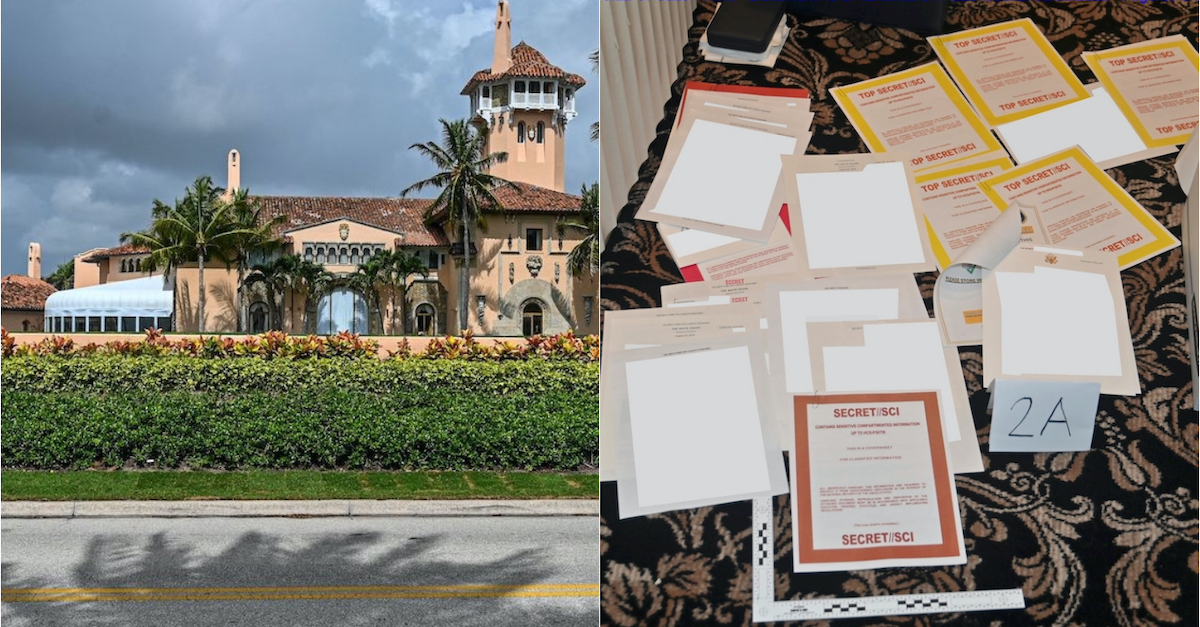
Just hours before appellate court arguments in the Mar-a-Lago case, former President Donald Trump’s attorneys asked a lower court judge for an unsealed version of the affidavit supporting the search of his country club and primary residence.
“Government agents acted with abandon in seizing [Trump]’s property,” Trump’s attorney Lindsey Halligan claimed in her filing. “They seized attorney-client privileged documents, passports, items of clothing, personal photographs, books, and private correspondence between Plaintiff and his friends and family. At the start of the search, counsel for President Trump requested a copy of the search warrant and supporting affidavit. The Government declined this request. Following their nine-hour search, the Government did provide a copy of the search warrant and return, but again refused to provide the affidavit.”
In a footnote, Halligan described as “bizarre” that agents asked Trump’s lawyers to turn off security cameras during the search, “implausibly citing ‘agent safety’ despite the presence of numerous U.S. Secret Service agents.” Trump regularly vilifies his perceived enemies, including journalists, judges, and former U.S. Ambassador to Ukraine Marie Yovanovich when she testified at his first impeachment proceedings. As recently seen in his litigation with rape accuser E. Jean Carroll, he occasionally circulates the images of his critics and antagonists.
The FBI and the Department of Homeland Security reported an “unprecedented” level of threats after the Aug. 12th search at Mar-a-Lago.
Trump’s request will go before one of his appointees in the Southern District of Florida: U.S. District Judge Aileen Cannon, who repeatedly ruled in his favor in the past and was previously overturned on appeal. In September, the 11th Circuit overruled Cannon’s orders temporarily blocking the Justice Department from using seized documents marked classified up to “Top Secret” and above for their criminal investigation.
Trump’s latest request for Judge Cannon came as the appeals court was just hours away from hearing oral arguments over the fate of documents without classification markings.
Even though the future of the privilege review appears to be in doubt, Trump’s lawyers insist: “Plaintiff cannot vindicate his Constitutional rights unless he is permitted to review the search warrant affidavit.”
Trump’s lawyers also alleged, without evidence, that the Justice Department has leaked aspects of the investigation to the press.
“The exceptional circumstances here—including a virtually limitless search of a President’s home, the seizure of huge amounts of personal materials including attorney-client privileged documents, and an Attorney General’s publication of the Government’s position in an unprecedented press conference—require the disclosure of the affidavit,” the filing states. “The idea that the Government must keep the details of the affidavit from Plaintiff is further undermined by the repeated leaks by DOJ of selected and misleading information.”
Though the Justice Department acknowledged the “unfortunate” existence of leaks to news media, it has insisted that those disclosures have not come from prosecutors.
Unlike the search warrant materials already made public, the supporting affidavit would likely include more detailed information about the Justice Department’s witnesses and investigative technique, but Trump’s legal team claims it would be “farcical” to worry about reprisal against those providing information against the former president.
The lawyers claim: “[M]aking the search warrant affidavit available to President Trump himself would not raise any such concerns.”
Prominent national security lawyer Brad Moss predicted that Trump’s maneuver would flop.
“Keeping the gritty details under wraps makes obvious sense in a criminal inquiry relying upon witness testimony from apparent insiders,” Moss told Law&Crime. “There is no need for Mr. Trump to know that information at this stage outside of potentially pressuring individuals to recant their testimony, which is exactly why this type of information is not generally made known pre-indictment. This is a hail mary pass that should be batted down with ease.”
Former federal prosecutor Mitchell Epner added that granting Trump’s request would be “extraordinary.”
“That ordinarily only occurs after indictment as part of a motion to suppress evidence from being used at trial,” noted Epner, who is now at a partner at Rottenberg Lipman Rich PC. “The unredacted affidavit would give [Trump] major insight into the sources and methods of an ongoing investigation.”
A hearing in the pending 11th Circuit case is scheduled to take place at 2 p.m. Eastern Time. It will mark the first court proceeding involving the Mar-a-Lago investigation since special counsel Jack Smith took the helm.
Read Trump’s filing here.